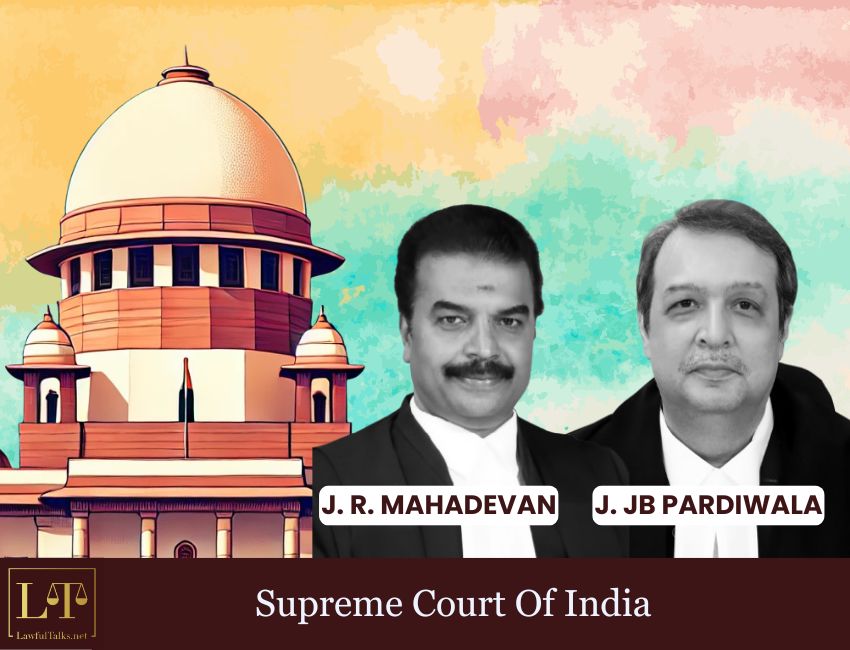Allahabad HC Sets Aside Afzal Ansari's Conviction, Allows Him to Continue as MP

The Supreme Court division bench of Justice J.B. Pardiwala and Justice R. Mahadevan, recently clarified that the dismissal of a suit or application for default under Order IX Rules 2 or 3 of the Civil Procedure Code (CPC) does not bar the filing of a fresh suit. The Court held that such dismissals do not amount to a judgment or decree, and hence, the principle of res judicata is not applicable. This decision provided clarity on the procedural law related to dismissals for default and their implications for future litigation.

The case originated with a Civil Suit filed by the father of the original plaintiffs, seeking a declaration, cancellation of a sale deed, and a permanent injunction. The suit was dismissed under Order IX Rule 2 of the CPC due to non-service of summons. A subsequent application for restoration under Order IX Rule 4 was also dismissed and went unchallenged, attaining finality. Afterward, the legal heirs (original plaintiff) filed a fresh suit for the same reliefs, which was decided in their favor by the Trial Court. The defendants appealed the decision, and the First Appellate Court reversed the Trial Court's judgment. The plaintiffs then filed a Second Appeal before the High Court, which reinstated the Trial Court's ruling. Aggrieved by this, the defendants approached the Supreme Court, contesting the High Court's decision.
The learned counsel representing the defendants raised three key arguments. First, they contended that the second suit was not maintainable, arguing that once the initial suit was dismissed and the restoration application under Order IX Rule 4 was rejected without appeal, a fresh suit on the same cause of action was barred. Second, the defense questioned the evidentiary value of the Wajib Dava (Exhibit P-1), asserting that the 1952 document was inadmissible because it was unregistered and allegedly violated Section 54 of the principles of Mohammedan Law in conjunction with Section 6(a) of the Transfer of Property Act, 1882. Lastly, the defendants argued that the fresh suit was barred by the doctrine of res judicata.
In contrast, Senior Advocate Ms. V. Mohana, representing the plaintiffs, argued that the High Court had committed no error in passing the impugned judgment. She maintained that the suit was legally maintainable and not barred by Order IX Rule 4 of the CPC. Regarding the Wajib Dava document (Exhibit P-1), she emphasized that the High Court had duly considered and assessed it. In light of these arguments, she contended that the petition lacked merit and should be dismissed.
After hearing the learned counsel for both parties and reviewing the materials on record, the Supreme Court framed two crucial legal issues for determination:
i) Whether after the dismissal of the petition for restoration of suit under Order IX Rule 4 of the C.P.C. a fresh suit is maintainable?
ii) Whether after dismissal of the suit for default, afresh suit is barred by res judicata?
The bench referred to the Privy Council's ruling in Bhudeo v. Musammat Baikunthi, affirming that remedies under Order IX Rule 4 are not mutually exclusive. It held that while Order IX Rule 9 explicitly bars a fresh suit after a dismissal under Rule 8, no such bar exists for suits dismissed under Rules 2 or 3. Hence, a fresh suit remains maintainable, subject to the law of limitation.
The Court emphasized that for res judicata to apply, there must be an adjudication of rights, resulting in a judgment or decree. Since a dismissal under Rules 2 or 3 does not amount to an adjudication and is not an appealable order, it does not fulfill the requirement of a "judgment" or "decree."
"It is, therefore, clear that an order of dismissal of a suit or application in default under Rule 2 or Rule 3 of Order IX of the C.P.C. is neither an adjudication or a decree nor it is an appealable order. If that is so, such order of dismissal of a suit under Rule 2 or Rule 3 of Order IX of the C.P.C. does not fulfill the requirement of the term 'judgment' or 'decree', inasmuch as there is no adjudication. In our considered opinion, therefore, if a fresh suit is filed, then such an order of dismissal cannot and shall not operate a res judicata." the Court stated.
The Supreme Court concluded that the dismissal of a suit for default does not prevent the filing of a fresh suit, and the principle of res judicata does not apply in such cases. The Court also upheld the High Court's handling of the Wajib Dava (Exhibit P-1), affirming its evidentiary value.
Ultimately, the Supreme Court dismissed the petition and disposed of any pending applications.
For Petitioner(s) :Mr. Vinay P. Tripathi, Adv. Mr. B. Shravanth Shanker, AOR Mr. Abhinav Jaganathan, Adv. Mr. B. Yeshwanth Raj, Adv. Mrs. Preeti Shukla, Adv.
For Respondent(s) :Ms. V. Mohana, Adv. Mr. Kaustubh Shukla, AOR Ms. Praveen Kumar Singh, Adv. Ms. Pushpanjali Singh, Adv. Ms. Bhavya Pande, Adv.
Case title: Amruddin Ansari (Dead) Through Lrs & Ors. vs. Afajal Ali & Ors, SLP(C) No. 011442 of 2023

Anam Sayyed
Latest Posts
Categories
- International News 19 Posts
- Supreme Court 390 Posts
- High Courts 383 Posts



















































































































































































































































































































































































































































































































































































































































































































































































































